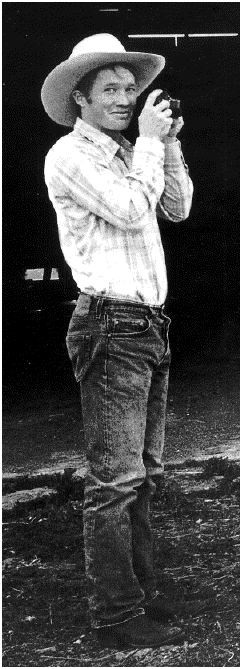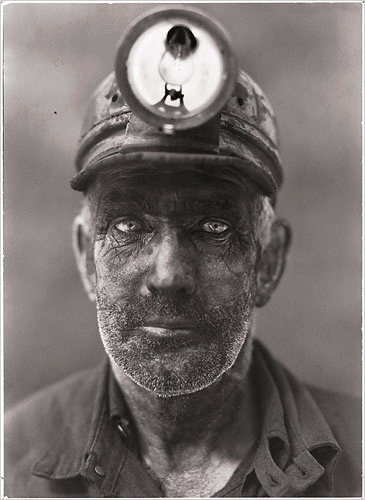From Coal Miners to Cowbys,
An Extraordinary Exploration of
The Unseen People Who Make
This Country Work
Jeanne Marie Laskas
(Putnam)

Ms. Laskas is a fine writer, and she brings all these laborers (and labors) to life: the blueberry pickers in Maine --- migrants all --- the oil riggers in Alaska, the air traffic controllers at LaGuardia Airport, the high-ballers in the middle west and the others who work so hard so we can eat our Cheerios for breakfast, fry our Black Angus steaks at supper, fly home for Thanksgiving, light our Santa Claus at Christmas and --- if need be --- purchase a Glock to protect ourselves from the enemies supposedly festering just outside.
There are some strange and wonderful facts mixed in with this collection of stories of the Hidden Americans:
- The first municipal dump in the Western world was near Athens, 500 B. C. "Citizens were required to dispose of their waste at least one mile from city walls."
- "Taxpayers pour their own dollars into making sure football happens --- ten of the nation's new $1 billion NFL stadiums are 100 percent government-financed, while another nineteen are at least 75 percent government-financed."
- Iowa 80 is the "world's largest truck stop" and it "goes through fifty-five miles of toilet paper each month."
- A coal mine is all white. The walls are painted with "rock dust" --- powdered limestone, a fire retardant. Without it, mines would be "spontaneous combustion waiting to happen."
- Our biggest export to China (besides debt) is wastepaper.
- The price for a top breeding bull in today's bull market: $100,000.
- There are 3,500,000 truckers in America, and they transport 69% "of the stuff we buy."
- No alcohol of any form is allowed on the oil-producing North Slope of Alaska. "A person getting caught with it will be run off for life, no questions asked, no second chance. The reason: Everything is flammable. One mistake and you could blow the place up."
When she asks Joe ("the high priest of trash") why more people don't know about landfill gas (methane being piped from dumps to generate electricity),
- He looks at me, weary: "What do you think I've been busting my ass at this for thirty years, lady?"
Sputter is a truck driver, a black truck driver. She and Laskas have been together on the road for days. When they arrive at a Travel America truck stop, they are ready to shower, but Laskas worries that it will be a group shower. "We're not in prison, girl!" Sputter says.
When Laskas pumps Billy Cermak's wife about the danger of his being a coal miner, he takes her aside later and says, "Look, I don't talk about the bad stuff in front of my wife, okay?"
And at Sprague's Gun Shop in Yuma, she expresses some reservation about their selling assault rifles to almost anyone who pops in the store ... until a salesman says in exasperation, "Have any of these rifles ever assaulted anyone?"
Persistence is her middle name, especially when she tells us of what was needed to get access to air traffic control at LaGuardia or an oil rig on Ooguruk Island, Alaska:
- It took nearly a year for me to gain access to the Slope. The corporate giants who control the fields --- BP, ConocoPhillips, ExxonMobil --- are famously private about what goes on up here.
"Famously private." Nice understatement. Schizophrenically and obnoxiously closed-mouthed might be a better one.
The pleasure is being alongside Laskas as she goes about penetrating, the mines, for example, seeing the pits as she now sees them during her weeks and months there: "A coal miner doesn't have time to sit around and ponder all of this: methane, bad top, no light, no standing, no bathroom, no water fountain, no phone, no radio, no windows, five hundred feet down, a couple of miles in."
- If I found that I could, in fact, mentally handle being inside a coal mine, it was only because I knew I was leaving.
And yet, when it is her time to leave, why is it that she does so reluctantly? Perhaps she's one of those people who get so tangled up in other people's problems and fears (and joys) that she becomes part of them, and, in this case, part of their jobs. Which is just what we want when we are getting the real skinny. One of the coal miners says to her in another case of terminal exasperation, "Isn't it about time you got back to your life? I can't take baby-sitting you anymore." Laskas explains, "I told him I wanted to leave, but I didn't want to leave."
On one of the coldest places on earth, the North Slope of Alaska, her guide orders her to get out because the drill has gone screwy and they are going to have to blast it. (It's something that might blast away all of them.) Again, she says, "I don't want to leave," and then, back in the dining hall reports that she feels "surprisingly sad about getting off the rig. It's hard to leave the place, hard to miss out on the unfolding mystery of what the earth is hiding."
And in one of the unlikeliest of places, in Yuma, in Sprague's, she ends up in the shooting range, testing a Ruger .22. She shoots, and asks for more bullets, and shoots, and asks for more bullets, and shoots, and asks for more bullets ... and when she leaves, she buys a Glock and an assault rifle. At home, the rifle goes in the basement, but she, one who would never say casually to anyone "I have a Glock in my handbag," keeps a Glock in her handbag and "it was heavy."
- It was inside a little nylon holster and it bounced around the bottom of my purse, where I got spearmint gum on it. I worried constantly about losing it or someone stealing it from me.
Leading us to believe ... no, leading us to know that Laskas has an addictive personality She gets addicted to the people or things she is supposed to be studying and coolly writing about, whether it's a black truck driver or a coal miner or a testy roughneck on the North Slope or some cowboy out in the Texas hill country or a guy who does garbage for crumb's sakes. Or even getting involved in a love affair with a Glock 9mm semiauto.

Laskas is a writer's writer, building into a throwaway passage a paean to all those people whom she should be writing about, who deserve our love and respect ...and can and will never get it; the people who fall so easily into the pool of invisible Americans:
- When I think about the women of hidden America, all the labor that traditionally falls on the shoulders of women, I think they are an enormous army of soldiers hidden in camouflage. The caretakers, the nannies, the maids, the sisters and the surrogate sisters, the mothers and the surrogate mothers, all those people tending hearts.